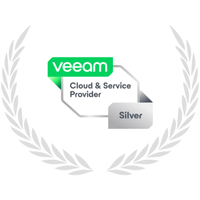Cloud Infrastructure Services
A vital technology that allows your business to access data and applications from anywhere with just an internet connection. Use IaaS and SaaS to improve your businesses efficiency and producitvity.
Cloud services allow you and your employees to access and use data, applications, and software over the internet, rather than having them stored locally on their computer or device. This provides flexibility and convenience, reduces costs, and improves security.
In the world of technology, the use of cloud computing has become increasingly popular. Infrastructure as a Service (IaaS) is one of the most popular forms of cloud computing, and it provides customers with a virtualised environment that can be used to host and manage their applications and data. We provide an overview of IaaS, as well as its various deployment models, such as public, virtual private, private, and hybrid clouds. Additionally, we discuss Software as a Service (SaaS) and provide an overview of some of our popular SaaS offerings, such as Microsoft 365, Active Directory Domain, ownCloud, and Microsoft SharePoint.
How your business benefits from our Cloud services
Cost savings
Our cloud services eliminate the need for your business to invest in expensive hardware and infrastructure, thus reducing your capital expenditure and improving efficiences.
Scalability
Your business can scale up or down on the use of cloud services based on your needs, without having to worry about upgrading or replacing hardware.
Security
We have advanced security and tracking measures in place, including data encryption and access controls, to protect your business’s sensitive data.
Disaster recovery
Our cloud services offer automated backup and recovery options, ensuring your business can recover from data loss or system failures quickly and easily.
Cloud Infrastructure Services
Public cloud
A cloud service offered to the general public. The cloud provider owns manages, and operates all computing resources located within the providers facilities, with available resources shared across all customers.
Virtual private cloud
A variation of public cloud wherein a segmented compartment of an otherwise public cloud infrastructure is dedicated to one customer.
Virtualisation
The process of creating software (or virtual) representation of something rather than a physical one. Can apply to applications, servers, storage and networks.
Private cloud
Cloud infrastructure operated for a single organisation. The cloud can be managed by the organisation or a third party. This can be hosted on premise or at a third-party data centre.
Hybrid cloud
A cloud service that is a combination of two or more of the previously defined deployment models.
Remote Workspace with:
Microsoft 365
Get access to familiar Microsoft Office tools plus enterprise grade email, conferencing and IT services.
Work from virtually anywhere, access your email, files and folders.
Active Directory Domain
The cornerstone of every Windows network.
Stores information about members of the domain, including devices and users,
verifies their credentials and defines their access rights.
ownCloud
Sync and share your data, with ease
ownCloud is the most straightforward way to file sync and share data. You don’t need to worry about where or how to access your files. With ownCloud all your data is where ever you are; accessible on all devices, any time.
Microsoft SharePoint
Enterprise business collaboration platform.
Easily control costs and reduce risks associated with IT through SharePoint.

How we price our Cloud Services:
Our cloud services, such as IaaS and SaaS are priced differently which is dependent on the size of the product and the customer requirements.
We utilise the following pricing structures when quoting on cloud services:
Subscription-based: This model involves paying a fixed fee on a regular basis (e.g., monthly or annually) to use the cloud service.
Pay-as-you-go: This model involves paying for the cloud service based on usage, typically in terms of computing resources, storage, or data transfer.
Resource-based: This model involves paying for the cloud service based on the specific resources used, such as the number of virtual machines, storage capacity, or network bandwidth.
Hybrid model: This model combines elements of different pricing models to offer a more flexible pricing structure, such as a fixed fee for a set amount of resources, with additional pay-as-you-go fees for additional usage beyond that set amount.
If you’re interested in learning more about how cloud services can benefit your business, take action today! Contact us to discuss which cloud solutions are right for you and start your journey towards a more streamlined, productive, and secure future with cloud services!
Our Certifications

Microsoft Partners

Cybersecurity Winners

Veeam Silver Partner

Usecure Partner

Sophos Platinum Partners
Our Work
Anova Health Institute
Public health Who are they The Anova Health Institute is an NGO that empowers people and changes lives. Good health and quality of life are what motivates us to provide healthcare solutions and support for those who need it most....
Global Golf
Import and retailWho are they Global Golf’s business model is comprised of its core business, which are large stock orders from America supplying corporate golf days, branded apparel and headwear for golf clubs throughout South...
Masslift Africa
Industrial forklift rental and salesWho are they Masslift Africa is the sole distributor of Mitsubishi forklifts in Southern Africa. Our customers come to us because of our commitment to service excellence and our varied product...
Liquid Concepts
Manufacturing and wholesaleWho are they For over 14 years, Liquid Concepts have been providing South African businesses with dynamic beverage and food solutions. We’re a unique company that offers turn 360 Concept activation,...
Contact Us
Does your business need IT support, IT problems fixed, a quote or new IT strategy? It is all possible with SevenC.
Contact us by completing the form below:


Physical address
Unit 36, Sunninghill Office Park
Peltier Drive
Sunninghill
Johannesburg
South Africa
⟶ Directions
Postal address
SevenC Computing
PO Box 2481
Sunninghill
2157
South Africa





